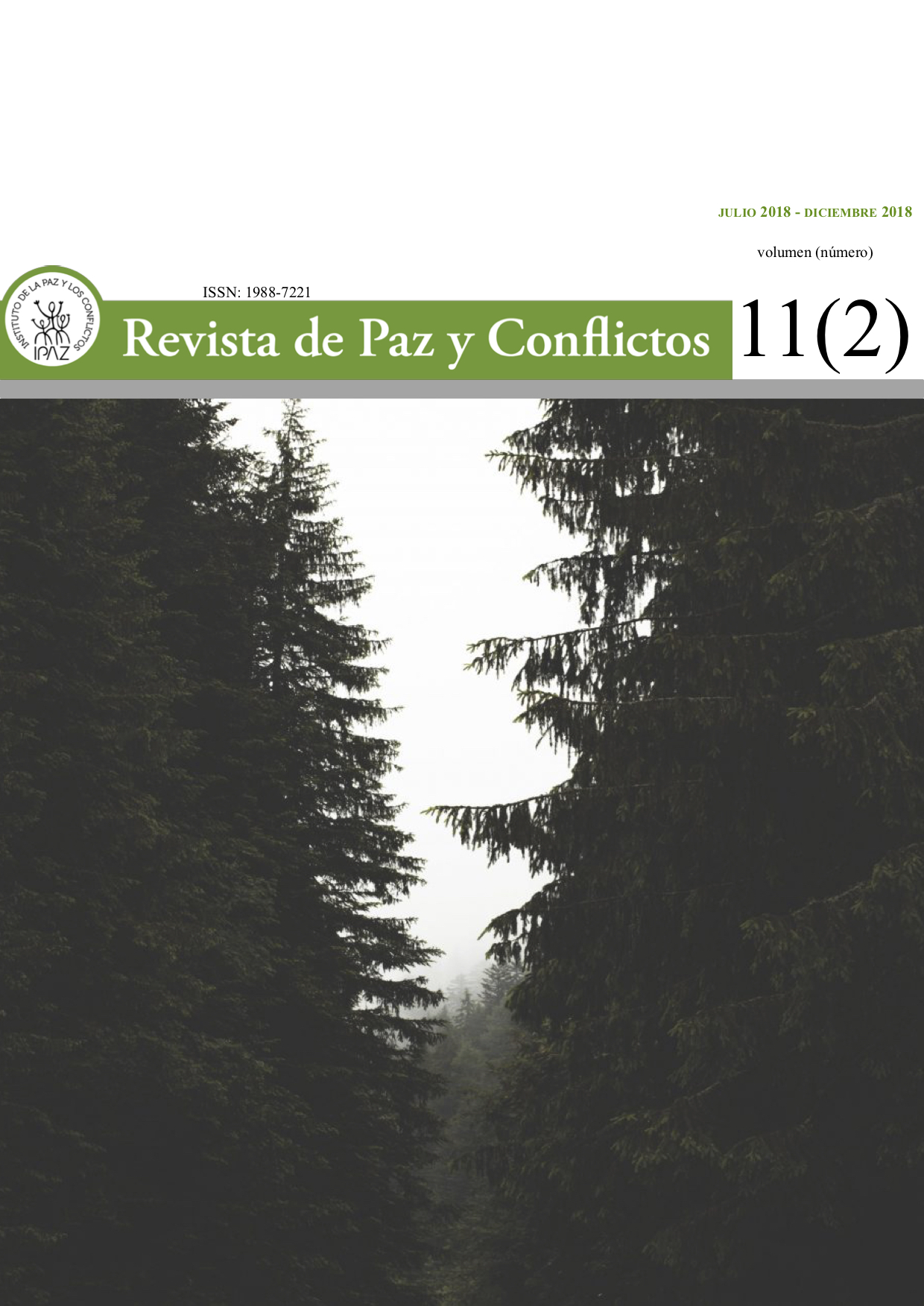Paz no democrática en América del Sur: regímenes militares y su impacto sobre la paz regional durante el siglo 20
DOI:
https://doi.org/10.30827/revpaz.v11i2.6039Palabras clave:
América del Sur, paz regional, rivalidad duradera, competencia militar interna, regímenes militaresResumen
Los regímenes militares sudamericanos fueron pacíficos en sus relaciones con los estados limítrofes a pesar del mantenimiento de numerosos conflictos territoriales y del uso extremo de la violencia en el ámbito interno. El artículo se concentra en el estudio de dos variables que favorecieron esta suerte de “paz no democrática”: el impacto de las rivalidades duraderas y el de la competencia entre facciones de las fuerzas armadas. El principal hallazgo es que estos aspectos impulsaron la larga paz regional aunque los actores que promovieron ambas dinámicas no tuvieron como principal objetivo la preservación de la paz. Por el contrario, el principal interés de las fuerzas armadas fue estratégico en el sentido de conservar el poder político y económico como así también evitar que alguna de las tres fuerzas acumule demasiado poder. En este sentido, la paz fue un resultado secundario de estos intereses.
Descargas
Citas
Basadre, Jorge (1981) La política y la historia, Lima, Lluvia Editores.
Bennett, Andrew (1997) “Measuring rivalry termination, 1816-1992”. Journal of Conflict Resolution, 41:2, pp. 227-254.
Buzan, Barry y Ole Weaver (2003) Regions and Powers. The Structure of International Security, Cambridge, Cambridge University Press.
Canelo, Paula (2016) La política secreta de la última dictadura argentina (1976-1983), Buenos Aires, Edhasa.
Centeno, Miguel A (2002) Blood and War: War and the Nation-State in Latin America, University Park, Pennsylvania State University Press.
Colaresi, Michael P.; Karen Rasler y William R. Thompson (2007) Strategic Rivalries in World Politics, Cambridge, Cambridge University Press.
Diehl, Paul F y Gary Goertz (2000) War and Peace in International Rivalry, Michigan, University of Michigan Press.
Doyle, Michael (1997) Ways of War and Peace, New York, W.W. Norton.
Galtung, Johan (1975) Essays in Peace Research. Vol.1, Copenhagen, Christian Ejlers.
Goertz, Gary y Paul Diehl (1992) “The empirical importance of enduring rivalries”, International Interactions, 18:2, pp. 151-163.
Goertz, Gary, y Paul Diehl (1993) “Enduring rivalries: Theoretical constructs and empirical patterns”, International Studies Quarterly, 37:2, pp. 147-172.
Gill, Lesley (2004) The School of the Americas: Military Training and Political Violence in the Americas, Duke, Duke University Press.
Hensel, Paul R (1994) “One Thing Leads to Another: Recurrent Militarized Disputes in Latin America, 1816-1986”, Journal of Peace Research 31:3, pp. 281-97.
Holsti, HaleviJ (1996) The State, War and the State of the War, Cambridge, Cambridge University Press.
Kacowicz, Arie (1998) Zones of Peace in the Third World: South America and West Africa in Comparative Perspective, Albany, State of New York Press.
Kacowicz, Arie (2005) The Impact of Norms in International Society: The Latin American Experience, 1881-2001, Notre Dame, University of Notre Dame Press.
Diario Kausachum (1982) Edición del 25 de Agosto, Lima, Perú.
Kydd, Andrew (1997) “Sheep in Sheep’s Clothing: Why Security Seekers Do Not Fight
Each Other”, Security Studies 7:1, pp.114–154.
Klaren, Peter (2004) Nación y sociedad en la historia del Perú, Lima, Instituto de Estudios Peruanos.
Klein, James, Gary Goertz, and Paul Diehl (2006) “The new rivalry data set: Procedures and patterns”, Journal of Peace Research 43, pp. 331-348.
Lee Ray, James (1998) “Does Democracy Cause Peace?”, Annual Review of Political Science 1, pp. 27-46.
Mansfield, Edward D y Brian M Pollins (2001) “The study of interdependence and conflict”, Journal of Conflict Resolution 45:2, pp. 834-859.
Mares, David (2001) Violent Peace: Militarized Interstate Bargaining in Latin America, New York, Columbia UniversityPress.
Martin, Felix (2006) Militarist Peace in South America, Nueva York, Palgrave.
Masterson, Daniel (1991) Militarism and Politics in Latin America. Peru from Sanchez Cerro to Sendero Luminoso, Westport, Greenwood Press.
McSherry, Patrice (2005) Predatory States: Operation Condor and Covert War in Latin America, Lanham, Maryland, Rowman & Littlefield Publishers.
Miller, Benjamín (2007) States, Nations, and the Great Powers: The Sources of Regional War and Peace, Cambridge, Cambridge University Press.
Novaro, Marcos y Palermo, Vicente (2003) La dictadura militar. Del golpe de estado a la restauración democrática, Buenos Aires, Paidós.
Parra Herrera, Germán (2006) “Perú y Chile estuvieron a punto de ir a una guerra en los 70”, Diario Critico, http://www.diariocritico.com/noticia/3281/noticias/peru-y-chile-estuvieron-a-punto-de-ir-a-una-guerra-en-los-70.html, (Consultado el 22 de marzo de 2017).
Resende-Santos (2002) “The Origins of Security Cooperation in the Southern Cone”, Latin American Politics & Society 44:4, pp. 89-126.
Rosencrance, Richard y Peter Thompson (2003) “Trade, Foreign Investment, and Security”, Annual Review Political Science 6, pp. 377-398.
Russell, Roberto (1990) Política exterior y toma de decisiones en América Latina, Buenos Aires, Grupo Editor Latinoamericano.
Russett, Bruce (1993) Grasping the Democratic Peace, Princeton, Princeton University Press.
Russett, Bruce (1996) “¿Why liberal peace?”, en: Brown Michael, Stephen Lynn-Jones y S E Miller (eds.) Debating the Democratic Peace, Cambridge, MIT Press, pp. 82-115.
Russett, Bruce M y John Oneal (2001) Triangulating Peace: Democracy, Interdependence, and International Organization. New York, Norton.
Sotomayor Velazquez (2004) “Civil-Military Affairs and Security Institutions in the Southern Cone: The Sources of Argentine-Brazilian Nuclear Cooperation”, Latin American Politics & Society 46:4, pp. 29-60.
Uriarte, Claudio (2011) Almirante Cero, Buenos Aires, Planeta.
Vasquez, John (1993) The War Puzzle, Cambridge, Cambridge University Press.
Villacrez Riquelme, Ely (2014) Patriotas y Traidores, Lima, sin editorial.
Villar Gertner, Andres (2016) Autonomy and Negotiation in Foreign Policy: The Beagle Channel Crisis, New York, Palgrave Macmillan.
Descargas
Publicado
Cómo citar
Número
Sección
Licencia
Esta obra está bajo una licencia internacional Creative Commons Atribución 4.0.














